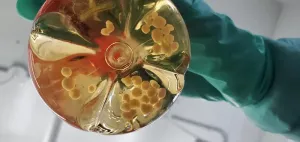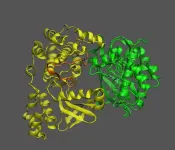(Press-News.org) In recognition of her exceptional work in advancing health equity, the Society of General Internal Medicine (SGIM) bestowed its 2024 Herbert W. Nickens Award to Rita Lee, MD, a University of Colorado Department of Medicine faculty member, at a May 17 meeting in Boston.
“The committee has chosen to honor you as an exemplary SGIM member who has made prioritizing minority health and diversity the primary focus of your career,” Alana Biggers, MD, MPH, the chair of the award selection committee, said in a congratulatory letter to Lee.
The Herbert W. Nickens Award honors a member of SGIM, a global association of more than 3,300 academic general internists, for demonstrating outstanding commitment to cultural diversity in medicine or improving minority health.
CU Department of Medicine Chair Vineet Chopra, MD, MSc, who serves as an SGIM council member, says this is the highest award given by SGIM for promoting justice and cultural diversity in medicine.
“Dr. Lee is truly a phenomenon. She is committed, passionate, and dedicated to the mission of improving diversity in medicine,” Chopra says. “She is most deserving of this recognition.”
Lee, a professor and the associate division head of education for the Division of General Internal Medicine, has been a member of SGIM for more than 20 years. Throughout her career, she has dedicated herself to promoting health equity for patients and health professionals alike, such as helping create the UCHealth Integrated Transgender Program and the Foundations in Equity Certificate Program.
In her letter, Biggers said Lee has forged “a new path in academic medicine that future generations of physicians can confidently emulate.”
“Ultimately your brilliance and fortitude has fostered a sphere of influence that has changed not only your home institution but has far reaching impact nationally and within Society of General Internal Medicine,” Biggers added.
When Lee opened the letter and learned she had won the award, she stared at it in disbelief, saying she felt shocked, surprised, and humbled.
“To me, it represents the work of many different teams I’ve been fortunate to be a part of, and it’s an acknowledgement of the importance of what we collectively do,” she says. “It’s not just about me. It’s really about everybody trying to move in the right direction.”
Becoming a leader for health equity
Even as a child, Lee knew she one day wanted to become a doctor, with her first patients being stuffed animals.
Her interest in doing health equity work came later, when she attended medical school at UCLA in the ‘90s. In the middle of her medical schooling, she came out to herself as a lesbian.
“Things were very different back then. It was a time when being out could get you kicked out of the profession,” she says. “I had a couple of health care experiences that were not very inclusive or friendly, and I also realized that I didn't get any education in LGBTQ+ health in medical school training.”
She and her classmates had very few patient cases or lectures that involved LGBTQ patients, or even patients with Asian identities, says Lee, who is Chinese.
“As somebody who was relatively empowered and knew the medical system, I didn't feel welcome or included. I figured if I felt this way — what is it like for our patients?” Lee says.
She began introducing LGBTQ-related content to her medical school, beginning a pattern of advocacy that would extend the rest of her career.
‘We can change society’: A look at Lee’s impact
Today, Lee advances health equity in a variety of ways. She is a founding member of the UCHealth Integrated Transgender Program, where a team of professionals work to provide gender-affirming care to transgender and gender diverse adults.
Lee is also the director of the Health Equity in Action Lab for the CU Anschutz Office of Diversity, Equity, Inclusion, and Community Engagement. In this role, she helped develop the Foundations in Equity Certificate Program to train people on topics like implicit bias, equity, and inclusive language.
“We realized when different, siloed groups were doing work on diversity, they were all talking about different things. We created the certificate program to be able to have shared language and framework across this campus for how we want to do things,” she says.
“We broke things down so it doesn’t seem overwhelming and shows people how they can be more inclusive. And we’re hearing from a lot of people that they are beginning to feel a sense of belonging from doing this work and are feeling empowered to make changes,” she adds.
As the co-director for Health and Society, the CU School of Medicine’s health systems science curriculum, Lee is proud to have helped develop a curriculum with a health equity lens.
“We built a case review committee to try to decrease a lot of the stereotyping and stigma that was in the curriculum before it was reformed,” she says. “Our hope is that health equity and the determinants of health are now engrained in students’ minds as they move into practice.”
Her work as an advocacy leader extends beyond the CU Anschutz campus. She sits on the advisory board for the National LGBTQIA+ Health Education Center, and she also chaired an SGIM anti-racist work group, helping develop anti-racist policies for the organization.
“For me, my mission has been examining, understanding, and then dismantling structural racism and oppression. It’s within our educational system, and it’s within our health care system. Those are the two areas I primarily focus on,” she says.
“As an educator who is also teaching others an approach to do this themselves, my hope is to shape future physicians, practitioners, researchers, and all the people on this campus, and to encourage them to advocate within their spheres of influence to be the change,” she adds. “We are society; therefore, we can change society.”
END
CU faculty member receives prestigious award for health equity work
The Society of General Internal Medicine presented Rita Lee, MD, with its 2024 Herbert W. Nickens Award for her work in promoting justice and cultural diversity in medicine
2024-05-17
ELSE PRESS RELEASES FROM THIS DATE:
Better medical record-keeping needed to fight antibiotic overuse, studies suggest
2024-05-17
A lack of detailed record-keeping in clinics and emergency departments may be getting in the way of reducing the inappropriate use of antibiotics, a pair of new studies by a pair of University of Michigan physicians and their colleagues suggests.
In one of the studies, about 10% of children and 35% of adults who got an antibiotic prescription during an office visit had no specific reason for the antibiotic in their record.
The rate of this type of prescribing is especially high in adults treated seen in emergency departments and in adults seen in clinics who have Medicaid coverage or no insurance, the ...
Clinicians report success with first test of drug in a patient with life-threatening blood clotting disorder
2024-05-17
Key Takeaways
Immune thrombotic thrombocytopenic purpura, a rare blood clotting disorder, results from an autoimmune attack against an enzyme called ADAMTS13
A recombinant form of human ADAMTS13 approved for a different condition helped to save the life of a young mother with immune thrombotic thrombocytopenic purpura
Results from this first use of the drug for this condition—by a team led by researchers from Massachusetts General Hospital—warrants testing the drug in a clinical trial
A team led by investigators from Massachusetts General Hospital, a founding member of the Mass General Brigham healthcare system, used a new drug to save the life of a patient ...
NIH study shows chronic wasting disease unlikely to move from animals to people
2024-05-17
WHAT:
A new study of prion diseases, using a human cerebral organoid model, suggests there is a substantial species barrier preventing transmission of chronic wasting disease (CWD) from cervids—deer, elk and moose—to people. The findings, from National Institutes of Health scientists and published in Emerging Infectious Diseases, are consistent with decades of similar research in animal models at the NIH’s National Institute of Allergy and Infectious Diseases (NIAID).
Prion diseases are degenerative diseases found in some mammals. These diseases primarily involve deterioration of the brain but also can affect the eyes and other organs. ...
Scientists discover mechanism of sugar signaling in plants
2024-05-17
UPTON, N.Y. — Proteins are molecular machines, with flexible pieces and moving parts. Understanding how these parts move helps scientists unravel the function a protein plays in living things — and potentially how to change its effects. Biochemists at the U.S. Department of Energy’s (DOE) Brookhaven National Laboratory and colleagues at DOE’s Pacific Northwest National Laboratory (PNNL) have just published a new example of how one such molecular machine works.
Their paper in the journal Science Advances describes how the moving parts of ...
Cleveland Clinic research finds VISTA directly blocks T-cells from functioning in immunotherapy
2024-05-17
A Cleveland Clinic-led team of scientists and physicians have discovered that the immune checkpoint protein VISTA can directly turn off tumor-fighting T-cells during immunotherapy and resist treatment.
The study, published in Science Immunology, explains that VISTA can bind to a protein called LRIG1 in T cells, which was previously only thought to promote bone and fat development. When VISTA binds to LRIG1, the researchers found, LRIG1 sends signals that suppress T cell replication, survival ...
Pagan-Christian trade networks supplied horses from overseas for the last horse sacrifices in Europe
2024-05-17
Horses crossed the Baltic Sea in ships during the Late Viking Age and were sacrificed for funeral rituals, according to research from Cardiff University.
Published in the journal Science Advances, studies on the remains of horses found at ancient burial sites in Russia and Lithuania show that they were brought overseas from Scandinavia utilising expansive trade networks connecting the Viking world with the Byzantine and Arab Empires.
Up to now, researchers had believed sacrificial horses were always locally-sourced stallions. ...
University of Bristol researchers develop world’s smallest quantum light detector on a silicon chip
2024-05-17
Researchers at the University of Bristol have made an important breakthrough in scaling quantum technology by integrating the world’s tiniest quantum light detector onto a silicon chip.
A critical moment in unlocking the information age was when scientists and engineers were first able to miniaturise transistors onto cheap micro-chips in the 1960s.
Now, for the first time, University of Bristol academics have demonstrated the integration of a quantum light detector – smaller than a human hair – onto a silicon chip, moving us one step closer to the age of quantum technologies using light.
Making high performance electronics ...
Gut bacteria boost immune response to fight tumors
2024-05-17
Roughly one in five cancer patients benefits from immunotherapy – a treatment that harnesses the immune system to fight cancer. Such an approach to beating cancer has seen significant success in lung cancer and melanoma, among others. Optimistic about its potential, researchers are exploring strategies to improve immunotherapy for cancers that don’t respond well to the treatment, with the hope of benefiting more patients.
Now, researchers at Washington University School of Medicine in St. Louis have found, in ...
How heatwaves are affecting Arctic phytoplankton
2024-05-17
The basis of the marine food web in the Arctic, the phytoplankton, responds to heatwaves much differently than to constantly elevated temperatures. This has been found by the first targeted experiments on the topic, which were recently conducted at the Alfred Wegener Institute’s AWIPEV Station. The phytoplankton’s behaviour primarily depends on the cooling phases after or between heatwaves, as shown in a study just released in the journal Science Advances.
Heatwaves, which we’ve increasingly seen around the globe in recent years, are also becoming more and ...
NUS scientist Professor Lim Chwee Teck elected Fellow of the Royal Society
2024-05-17
Professor LIM Chwee Teck, Director of the Institute for Health Innovation & Technology at the National University of Singapore (NUS iHealthtech) and NUSS Professor, has been elected to the prestigious Fellowship of the Royal Society, in recognition of his invaluable contributions to science.
The Royal Society is the world's oldest and most esteemed scientific academy in continuous existence, as well as the United Kingdom’s national academy of sciences. Fellows are elected annually, and candidates are evaluated based on their exceptional achievements in science. This ...
LAST 30 PRESS RELEASES:
Cost of copper must rise double to meet basic copper needs
A gel for wounds that won’t heal
Iron, carbon, and the art of toxic cleanup
Organic soil amendments work together to help sandy soils hold water longer, study finds
Hidden carbon in mangrove soils may play a larger role in climate regulation than previously thought
Weight-loss wonder pills prompt scrutiny of key ingredient
Nonprofit leader Diane Dodge to receive 2026 Penn Nursing Renfield Foundation Award for Global Women’s Health
Maternal smoking during pregnancy may be linked to higher blood pressure in children, NIH study finds
New Lund model aims to shorten the path to life-saving cell and gene therapies
Researchers create ultra-stretchable, liquid-repellent materials via laser ablation
Combining AI with OCT shows potential for detecting lipid-rich plaques in coronary arteries
SeaCast revolutionizes Mediterranean Sea forecasting with AI-powered speed and accuracy
JMIR Publications’ JMIR Bioinformatics and Biotechnology invites submissions on Bridging Data, AI, and Innovation to Transform Health
Honey bees navigate more precisely than previously thought
Air pollution may directly contribute to Alzheimer’s disease
Study finds early imaging after pediatric UTIs may do more harm than good
UC San Diego Health joins national research for maternal-fetal care
New biomarker predicts chemotherapy response in triple-negative breast cancer
Treatment algorithms featured in Brain Trauma Foundation’s update of guidelines for care of patients with penetrating traumatic brain injury
Over 40% of musicians experience tinnitus; hearing loss and hyperacusis also significantly elevated
Artificial intelligence predicts colorectal cancer risk in ulcerative colitis patients
Mayo Clinic installs first magnetic nanoparticle hyperthermia system for cancer research in the US
Calibr-Skaggs and Kainomyx launch collaboration to pioneer novel malaria treatments
JAX-NYSCF Collaborative and GSK announce collaboration to advance translational models for neurodegenerative disease research
Classifying pediatric brain tumors by liquid biopsy using artificial intelligence
Insilico Medicine initiates AI driven collaboration with leading global cancer center to identify novel targets for gastroesophageal cancers
Immunotherapy plus chemotherapy before surgery shows promise for pancreatic cancer
A “smart fluid” you can reconfigure with temperature
New research suggests myopia is driven by how we use our eyes indoors
Scientists develop first-of-its-kind antibody to block Epstein Barr virus
[Press-News.org] CU faculty member receives prestigious award for health equity workThe Society of General Internal Medicine presented Rita Lee, MD, with its 2024 Herbert W. Nickens Award for her work in promoting justice and cultural diversity in medicine





